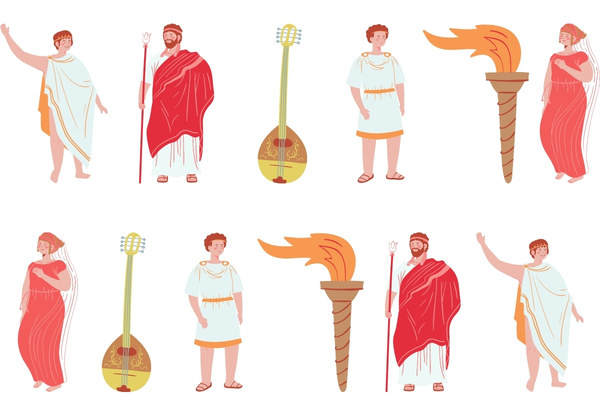It might be hard to believe that we can trace the origins of DISC Theory back to 3 BC and the so-called “father of medicine,” Hippocrates.
Yes, that’s right! Today’s web-based automated Extended DISC® profiling can trace its core ideas back to ancient times. Originally applied to medicine, Hippocrates also applied his well-known concept of Humourism or the Four Temperaments to behaviour.
What is the Four Temperaments Test?
The four temperaments test is a questionnaire used to determine your dominant temperament. The four temperaments test will ask you questions and analyse your answers to determine whether you are a Sanguine, Choleric, Melancholic or Phlegmatic.
The four temperaments theory traces back to the ancient medical concept of humourism and the idea that four bodily fluids can affect personality traits and behaviours. Although the Four Temperaments test is not used in science today, the concept informed many personality tests today.
What are the four temperaments of personality?
The Four Temperaments describe four bodily fluids and how they affect human personality traits and behaviours. Hippocrates theory is one of the earliest behavioural profiling systems and today we know them as the greek personality types. Despite being different to the DISC personality profiling types we use today, there are lots of similarities between the 4 temperaments and the greek personality types.
Another Greek physician, Claudius Galenus of Pergamum (AD 131-201), better known as Galen, further interpreted Hippocrates’ earlier ideas Galen applied his ideas to human biology with some relation to behavioural traits. Although no longer accepted in modern medical practice, the concept influenced modern psychologists and contributed to the emergence of behavioural theories.
The Four Temperaments continue to feature in the work of behavioural theorists through history. Different theorists have different descriptions for each behavioural type. However, it is fascinating to note the relative consistency of these various interpretations of the original Humourism Theory.
Sanguine Personality Type
The Sanguine personality type is very social and enjoys being around others. They are typically enthusiastic, active, and social. A sanguine is generally light-hearted, confident and loves to entertain. Sanguine temperaments can also be arrogant, indulgent and impulsive, and act unpredictably. They will seek out variety in their work and immediate environment to reduce boredom. Sanguine personalities are much like the type I personality in DISC.
Sanguine personality traits include:
- Talkative
- Enthusiastic
- Active
- Social
- Lively
- Optimistic
Choleric Personality Type
Choleric personality types are doers and leaders. Dominant Choleric types are typically decisive, goal-orientated and ambitious. They usually make great businesspeople. Choleric temperaments are logical and practical. However, they can be angry, suspicious and can also dominate the other temperaments. Choleric personality types are similar to the Dominant DISC Type or D Style.
Choleric personality traits include:
- Decisive
- Goal-orientated
- Ambitious
- Results-orientated
- Logical
Melancholic Personality Type
Their perfectionist and analytical nature characterise the personality of a Melancholic personality type. Melancholic temperaments are extremely thorough and accurate. They are often kind and considerate but can become overly occupied with detail. This temperament is like the Conscientious DISC Type or C Style.
Melancholic personality traits include:
- Analytics
- Detail-oriented
- Deep thinkers
- Reserved
- Accurate
Phlegmatic Personality Type
Phlegmatic personality types are usually people-orientated and seek out close relationships. Phlegmatic temperaments are easy-going and calm people who bring peace and harmony to their environments. Phlegmatic personality types are consistent, curious, and observant. They are sympathetic to others. However, their shy personality can often make them lazy and resistant to change. Phlegmatic personalities are similar to the Steadiness DISC Type or S Style.
Phlegmatic personality traits include:
- Relaxed
- Peaceful
- Quiet
- Easy-going
- Friendly
- Helpful
DISC vs Four temperaments
The most important correlation between the Four Temperaments and DISC Theory is how the styles are interrelated and balanced against each other. For instance, a Choleric personality is a diametric opposite of a Phlegmatic personality. Subsequently, we can map the styles on a pair of overlapping axes, much like the four-quadrant model of DISC Theory.
No one is exclusively one temperament or behavioural type. An individual is likely to have a dominant style which is supported by a mixture of the other types. We can all adapt our style according to different environments and in response to different situations. Understanding behavioural models such as Extended DISC® or the Four Temperaments helps us recognise the behavioural type of ourselves and others and adjust our behaviour accordingly.
Each of Galen’s words describing the four temperaments has altered with the passing of nearly two thousand years, but the theory behind these concepts lives on. From David Keirsey’s interpretation to British psychologist Hans Jurgen Eysenck personality inventory and psychiatrist Carl G. Jung, the work of some of the most outstanding scientists and behaviourists in the world incorporate the ideas of four behavioural types.
Unlike many HR and workplace tools, where there are questions about validity and reliability, DISC stands on the solid work of numerous researchers, academics and psychologists. When it comes to the idea of the four behavioural styles, you could say, it was validated by some of the most influential names in world history. This behavioural concept has genuinely stood the test of time.




